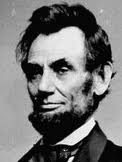 Lincoln’s Massachusetts “Bobbin Boy,” was the President’s first appointment as a Brigadier General of Volunteers, eventually earning the nickname,”Commissary Banks.” One of Lincoln’s many trials at the beginning of the Civil War, was the lack of trained soldiers to initially protect the nation’s Capitol. Supposedly, Massachusetts had the largest trained and armed militia in the country. There was one career politician from this state who could raise the volunteers and cash that Lincoln needed, a well-connected, former “Bobbin Boy,” named Nathaniel P. Banks.
Lincoln’s Massachusetts “Bobbin Boy,” was the President’s first appointment as a Brigadier General of Volunteers, eventually earning the nickname,”Commissary Banks.” One of Lincoln’s many trials at the beginning of the Civil War, was the lack of trained soldiers to initially protect the nation’s Capitol. Supposedly, Massachusetts had the largest trained and armed militia in the country. There was one career politician from this state who could raise the volunteers and cash that Lincoln needed, a well-connected, former “Bobbin Boy,” named Nathaniel P. Banks.
Nathaniel Prentice Banks, was born January 30, 1816, in Waltham, Massachusetts. With little formal education, Banks found work early in a cotton factory as a “bobbin boy,” apprenticed with sewing machine inventor Elias Howe, edited several local newspapers and studied law under a mentor who was an attorney and politician. Banks developed a distinctive oratorical style and was admitted to the State Bar at 23. A career in politics began with a stint in the State Legislature, followed by several terms in the U.S. House of Representatives, where he was elected Speaker in 1856. He quit in 1858, to become Governor of the State of Massachusetts and in 1861 was recruited by Lincoln to become the first politically appointed Brigadier General of Volunteers.
 General “Bobbin Boy” Banks was another of the political appointees, that had no military experience and his only claim to fame was the connections that he had garnered in Washington. Lincoln was no fool, he knew that Bank’s was inept, but his ability to raise fresh troops and cash made his position mandatory. All of Bank’s varying commands were utter failures, Annapolis, the Shenandoah Valley, where he got his nickname,”Commissary Banks,” Jackson ran circles around his troops, raiding and commandeering his supply trains, the Defenses of Washington, spent partying and impressing his political friends and replacing another worthless appointee, General Butler in New Orleans. “Commissary Banks” most successful exploit was his investment of Port Hudson on the Mississippi River. His troops hammered at the Confederate defenses, being bloodily repelled each and every time. Finally after Vicksburg surrendered to Grant, the Confederates, having no other alternative, capitulated to Banks. Congress convened and conveyed to Banks a vote of unparalleled gratitude for the victory.
General “Bobbin Boy” Banks was another of the political appointees, that had no military experience and his only claim to fame was the connections that he had garnered in Washington. Lincoln was no fool, he knew that Bank’s was inept, but his ability to raise fresh troops and cash made his position mandatory. All of Bank’s varying commands were utter failures, Annapolis, the Shenandoah Valley, where he got his nickname,”Commissary Banks,” Jackson ran circles around his troops, raiding and commandeering his supply trains, the Defenses of Washington, spent partying and impressing his political friends and replacing another worthless appointee, General Butler in New Orleans. “Commissary Banks” most successful exploit was his investment of Port Hudson on the Mississippi River. His troops hammered at the Confederate defenses, being bloodily repelled each and every time. Finally after Vicksburg surrendered to Grant, the Confederates, having no other alternative, capitulated to Banks. Congress convened and conveyed to Banks a vote of unparalleled gratitude for the victory.
General Ulysses S. Grant’s grand battle strategy, had Bank’s forces next moving to capture Mobile, Alabama, however Banks had other self-serving plans. An expedition up the Red River, with a contingent of Cotton Speculators in tow, “Commissary Banks” became trapped by low water and after several demoralizing defeats, barely escaped with the majority of his troops and his contingent of disappointed Cotton Speculators. These “white gold” brokers had paid a premium for their adventure up the Red and were not pleased at the outcome. Grant in the meantime had his hands full with the real rebellion and asked that Banks be immediately relived. Halleck responded,
“Genl Banks is a personal friend of the President, and has strong political
supporters in an out of Congress. There will undoubtedly be a very strong
opposition to his being removed or superseded, and I think the President will
hesitate to act, unless he has a definite request from you to do so, as a
military necessity, you designating his successor or superior in command…The
President will require some evidence in a positive form to show the military
necessity of the act.”
General Nathaniel P. Banks last official command was his Red River Campaign, he was replaced by General Edward Canby in May of 1864. Lincoln’s Massachusetts “Bobbin Boy” was much better suited for the halls of Congress, rather than the dashing Civil War General “Commissary Banks.”
Bummer


Thanks for the info on Banks; he’s one of those early, disastrous Union commanders that it’s too easy to lump together. BTW, are you sure about Banks’s birthdate and admission to the Massachusetts bar? If so, he was admitted when he was 7.
Louis,
Thanks for the edit. Admitted to the Bar at 23 not 1823. Going to fast again and less than stellar proofing. The list of inept appointees is embarrassing. The KIA’s at Port Hudson was beyound fathom. One of the first where African Americans were used in great numbers. Thanks again for the correction.
Bummer